#humans are not consistent in character so why should they be in my drawings
Note
Advice for writing smut???
gonna do bullet-points of things i tend to live by when it comes to smut (this is just my opinion):
don't switch styles: the way you write the smut has to be consistent with the way you write the rest of the story, so if your story is more comedic or romcom-y in nature, the way you write the smut should have those stylings. i personally find it very jarring when authors decide to break the format for the smut, almost like the story has to stop for the sex intermission; if you're writing a horror story, the smut must be informed and influenced by that genre, and if you are breaking genre for the smut portion, tell us why you're suddenly switching gears (it has to be an aesthetic choice you're making on purpose). likewise, if your style in that story is more lyrical, the smut has to be somewhat lyrical too, or if your story is more cormac mccarthy-esque-cut-and-dry, the smut can't suddenly involve an effluvia of purple, sappy prose. integrating the smut in the story and treating it like any other part of the story is key to me. too often i've seen ppl switch to this anonymous pornified style when they get to the smut
which brings me to specificity. i'll talk about het sex, since that's what i tend to write most: not all men are going to be fingering or eating pussy the same way, not all dicks are big and they shouldn't be, not all women immediately get excited by fingering, not everyone moans the same way or makes the same sounds. you're writing about particular characters so it has to be particular to them. i know this is very old advice, but i think it bears repeating
there isn't an exact formula or sequence you have to follow, there aren't precise steps, you don't have to go "well, first he has to kiss down her neck, then reach the boob area, then play with the nipples, then put the nipple in his mouth, then slowly go down on her, then prepare her for entering her etc. etc. etc." this can get boring and repetitive and you start thinking of your characters as these mechanical dolls who have to fuck for your audience. and that can be a vibe too, if you do it on purpose. but sometimes you can get stuck in a porn routine (and ofc, having only the guy show initiative can also get boring)
in order to break that, insert some character moments. what are the characters thinking during this? sometimes they might be thinking of something completely unrelated on the surface, but which has a thematic relevance that can make the scene hotter. likewise, maybe they're doing smth that seems unsexy on the surface, but which, within the context of the story might be really hot. sex doesn't just involve, well, sex, but so much weirdness and humanity and creativity. two bodies (usually) are trying to do this really awkward thing together and they might have a lot of baggage and history to inform it. there's a lot you can do with that.
don't make it glossy and clean, where everyone smells of strawberry shampoo and there is never anything out of sync. the most boring smut tends to be the kind where no one makes any mistakes and everything is super efficient. i imagine it feels like using an industrial pump to milk various farm animals.
and you know what? you can make that hot too. you CAN write a kind of robotic efficient smut and make it really interesting based on the context. let's say you're writing a 1984 AU fic where ppl are forced into intimacy only to procreate and their sex drive is diminished. you can play with that premise and lean into the dehumanizing industrialization of sex, but you have to mean it, aka your narratorial voice must be conscious of these factors.
if you're writing dubcon, make the dubious part present, make sure you draw out the ambivalence and ambiguity. if you're writing noncon, the character whose consent is being violated has to be transformed by this in some way. it can be forced pleasure, for instance, but not only. it has to be a journey for them too, some kind of spiritual pit, or a form of access to terrible knowledge. i know this is a personal thing, but noncon doesn't work for me if the character being noncon'd is just sort of *there*, suffering passively. i think that sort of dead passivity can be done very well too, but the narratorial voice has to persuade me.
that being said, don't be afraid of fear in consensual sex. terror and vulnerability are a part of consensual sex too, imo, and again, depending on the story and the characters, there's a lot you can explore there
i personally find it really hot when the narratorial voice starts discussing some of the ideas that the story wants to convey during the smut. so like, you can characterize person A and outline their worldview and their plans while they're ramming person B, and the thinking & fucking are thus entwined. idk, i dig that
speaking of which, smut can convey world-building details and social/philosophical ideas, not just emotions and character beats
not all smut has to end with mutual orgasm or even one-sided orgasm, it depends what you want to do or where you want to go. again, you don't have to follow a sequence. plus, it's fun (and hot) to write about frustration and failure too.
if you want to mix up the descriptions, resort to the story & characters. you'll find it's easier to describe someone fondling a boob in a new or at least interesting way if you're thinking about that particular character in that particular story, and not just Man X from planet porn (sorry to be snarky, but mainstream erotica is soooo guilty of this)
screaming & really intense reactions are cool but they have to match the characters and the situations
sometimes, it's hotter if an effect is mild or negated, if the usual outcome doesn't happen; mix up the order of events, toy with the usual reactions. it's not about being original, it's about finding out what works for your characters. writing about sex is, in a way, a performance of it, an attempt to go through the sexual motions, to find out what works and doesn't, to engage with the erotics of text (roland barthes entered the chat)
if you are bored by your own smut, that's a problem. i know we all talk about how hard we find writing smut, and IT IS hard, and sometimes it's not enjoyable, because writing itself is often not enjoyable, but even when it's painful and annoying, it gives you that little intellectual kick like "huh, i'm creating this and making these people do this, and ohh look, i can maybe put this unnamable thing into words". but if you become bored, that's a sign you have to look at the language & characters and figure out what's not working for you
last thing i'll underline: pay attention to your narratorial voice. in this ordeal, you are the seducer. not the characters. you have to seduce us with words and context. your voice matters the most. you can persuade us of anything. but you have to be confident in your weirdness and particularity. this is your bedroom (so to speak), so invite us in.
548 notes
·
View notes
Note
whats little magic?
It is a puzzle game for the Super Famicom and Game Boy Color video game systems. I like the Game Boy Color game much more for its art direction, and it's also just more fun for me to play with the 'bubble magic' mechanic in that version. I wrote more about my enjoyment below, in case anyone is curious.
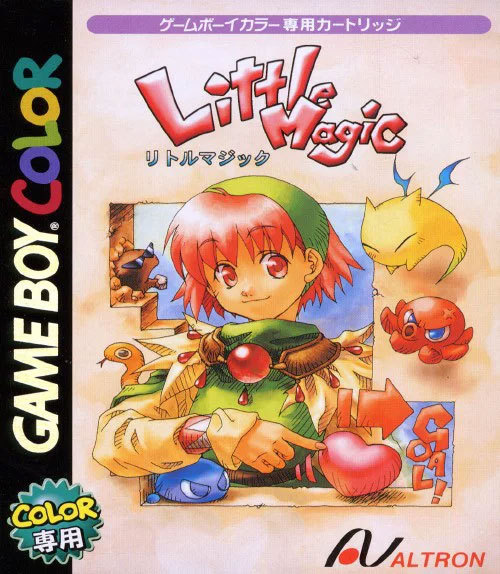
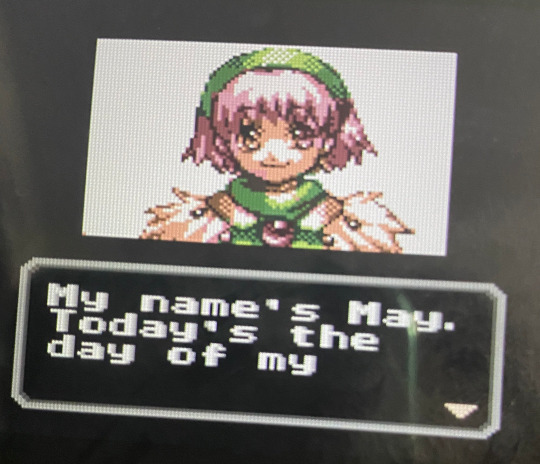
The game’s box art is very beautiful, right? It caught my eye right away. The in-game 'cutscene' artwork appears to be carefully-made pixel art versions of the same artist's illustrations and they are similarly beautiful. (Sorry in advance if my photograph quality is not great.)
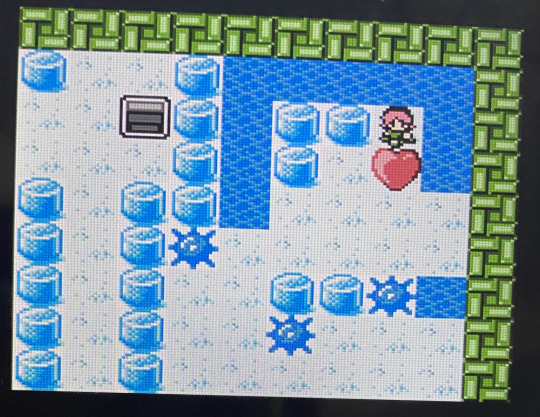
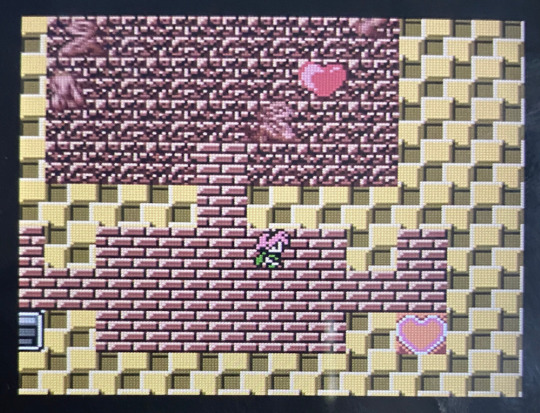
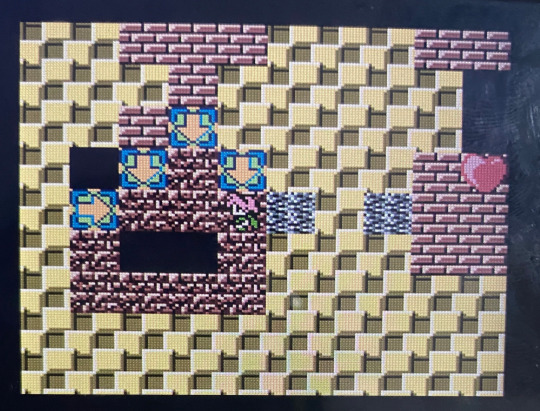
But the actual levels themselves look very haphazard. Clashing colors and tiles. It's easy enough to guess that a blue tile next to a white tile represents water and snow, respectively, but what does the yellow cluster-of-boxes tile represent? Yellow bricks of a tower…? How about the spike-y objects in the snow-water levels? I guessed they were underwater mines, but then there's the same tile in a later level too, just palette-swapped to be red… The two monochrome tiles in the third picture above teleports your character, but it has a two-frame animation that made me think of an ‘industrial grinder’ and ‘static noise’, so I assumed it was dangerous at first. Was it intended to be nondescript ‘sparkly magic’? Where are all of these levels taking place, anyway? No other humans are in these areas, just various animals and vague environmental indicators. There are cute snakes in some ‘yellow brick’ levels that end your life upon touching them. Seems irresponsible for a teacher to allow her student into perilous areas, no matter how eager she is to pass her final exam at magic school and become a magician.
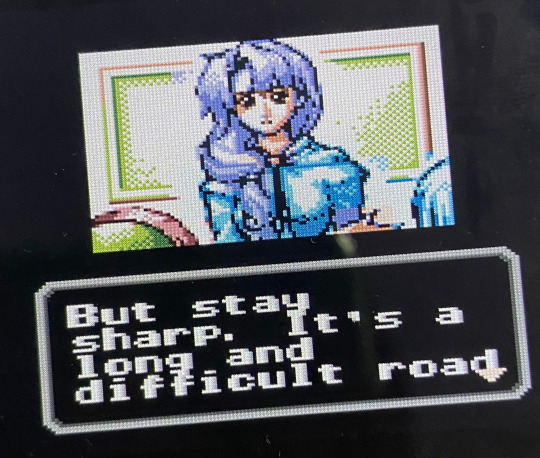
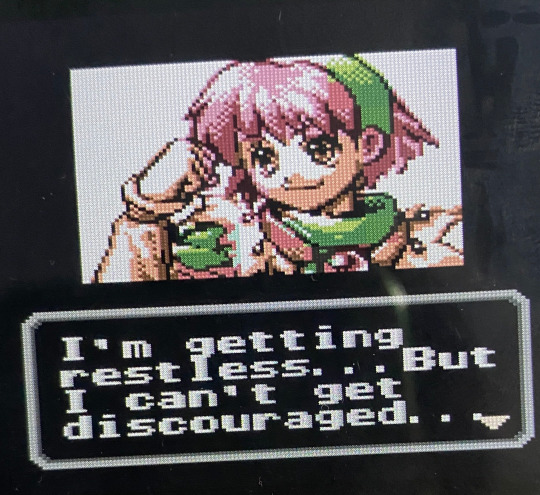
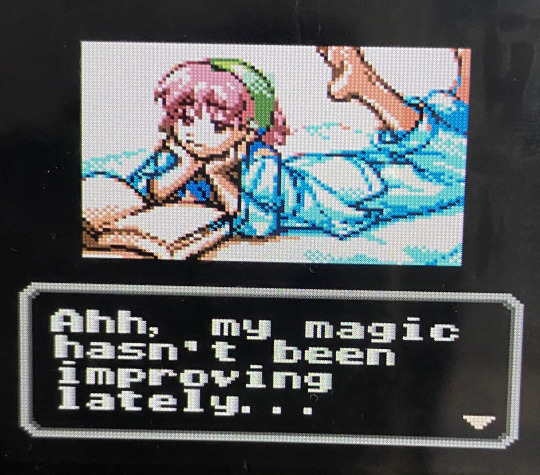

Oh, I should explain the story. (None of the above photos are in sequence, just wanted to show more of the game.) The story is about a girl who attends magic school, and aims to pass a series of tests to become a full-fledged magician. Her teacher encourages her. The lack of explanation in the story is another fun point for me. Her magic teacher doesn't explain why 'learning magic' consists of pushing a heart into a heart-shaped hole that triggers a staircase to appear, which is what you need to do to complete each level. (It’s a beating heart – is it alive?) No explanation as to why snakes end your life instantly upon touching them. The context of 'because you want to pass your exams, a teacher is putting you through trials to help you become a master of magic’ isn’t an adequate explanation, because the teacher also tells you that she has not passed the final exam - why is a teacher putting a student through something that is too difficult even for herself? Who is in control of all of the strange areas you need to ‘complete’ in order to become a real magician, then? (After you complete the game with the student, you can play a different set of levels as the teacher, but even the usual sparse context-giving ‘cutscenes’ are not there… Mysterious…)
So, all of that is why my drawing about ‘Little Magic’ is about ‘confusion’, ‘going along with something that makes sense at first, but quickly unravels to not make sense any longer’, ‘growing distrust of authoritative figures’, and ‘frustration from stagnation.’ https://petday.tumblr.com/post/730315736066768896
Maybe the instruction booklet explains everything; I did not have access to that while playing, and I like that feeling. ‘Renting a game from a video game rental store that did not come with an instruction booklet, and being perplexed by it, forced to create your own context because you have nothing else’ feeling. Randomly selecting games to play that do not have much documentation online is enjoyable to me, because of that feeling.
A fan translation group translated the Game Boy Color game from Japanese to English in 2018. There wasn't a lot of dialogue in the first place, though. I like games where there is little to no dialogue because one can imagine a story/context besides what is shown. Up until 2022, I could not find a solution for the teacher’s final puzzle, so I interpreted the ending of the game’s story as, ‘The magic teacher thought she could harness a type of magic far stronger than what she could handle, accidentally designed an impossible puzzle for herself and is trapped for eternity.’ Of course, the puzzle has a solution, but I wanted to honour my strange interpretation regardless. When I play games and have weird interpretations of them, I am definitely not saying, 'I bet this is what the people who worked on this game were thinking!' I dislike that attitude. It's just imaginative interpretation, and working with the odd way I interact with things in order to maximize fun for myself…
A part about old games that I also love, is that they can never be updated; they had one chance to release a finished game, and maybe another chance to fix glitches in a re-release if they sold very many copies the first time. I greatly enjoyed the ‘imperfect’ tilesets and abrupt feeling of this game, which might have been ‘improved’ in a patch if it had been released in recent years instead of 1999.
(I wasn’t sure where to include this point, but I must also say, my favourite YouTube comments are about someone’s unusual interpretations of a game, when they did not have access to a guide at the time. I read one recently – the comment author and their brother rented ‘Final Fantasy IV’ from a rental store, and they did not know about the ‘Poison’ status effect that depletes the characters health. There is a strange pixelation effect and a ringing sound when you walk around the overworld while poisoned. Because the save file they were playing from was during a point of the game where you visit the moon, and because of the unfamiliar visual and sound effect, they interpreted the ‘Poison’ status effect as, “The moon must be running out of air.” Things like that are beautiful to me.)
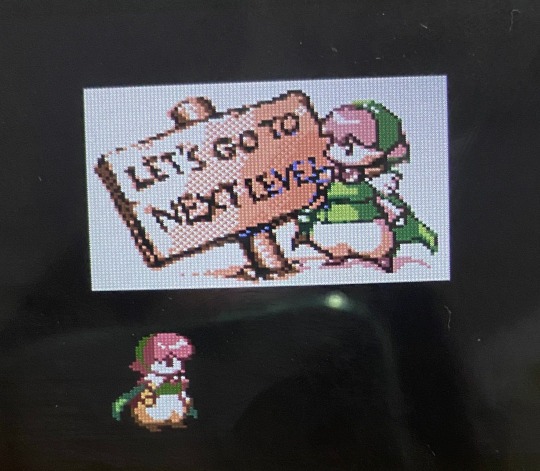
(I also wasn’t sure where to put this point, but the main character, May, from ‘Little Magic’, is stylized differently in some ‘cutscenes’. She resembles a dragon to me. It’s cute.)
276 notes
·
View notes
Text
Thoughts on giving critiques to comics artists.
Seeing lots of discussion from students about sour experiences with an unhelpful art teacher, so here's a long, long post about giving critiques.
NB: I have no formal training as a teacher, but I was a student, and I've spent decades giving artists feedback on their work.
When someone brings me a portfolio, I like to establish my limitations & clarify my perspective. My work is firmly rooted in traditional US comics storytelling (i.e., not manga or art-comics.) I can give feedback on other approaches but they should know where I’m coming from.
“We've only got a little time for this, so I'm going to spend that time focusing on things to correct. That doesn't mean you're doing everything wrong, or that there’s nothing good here, but it’ll be more helpful if I identify some problems and show you how to fix them.”
Why? Because for many young artists their entire sense of self worth is wrapped up in being good at what they do. (It was for me!) In school they were probably the best artist in their peer group. But now if they're hoping to turn pro, they’re at the bottom.
Sometimes you know what’s up when you see page 1, but try to keep an open mind. Some build their portfolios by sticking new pages at the back & don’t weed out the old stuff up front, so the work gets better as you go. When it’s like that I ask: “Show me your best 8 pages.”
I ask questions: "What's the goal? Do you want to be hired to work on someone else's project, or to get the story you're showing me here published?"
If 1, I steer towards a portfolio that'll showcase hirable skills.
If 2, I look for what tweaks will make that particular story more effective.
"Do you have teachers giving you regular feedback? What are they telling you?" Sometimes a student is getting bad advice. In cases like that, I'll do my best to be extra clear WHY I'm giving them advice that's 180 degrees from what they've been hearing.
“What artists are you looking at? Is there someone you admire or try to emulate?” This often helps me understand choices they're making, and I can sometimes incorporate things those artists do into my suggestions.
I ask myself questions about what I’m seeing. First: Is there a narrative? If not, I make it 100% clear I'm not speaking as any sort of expert. I'm good at critiquing storytelling, but don't have anywhere near as much to offer illustrators or designers.
Can I follow the story? Or am I confused about what's going on? Are the characters and settings drawn consistently?
If not, is the artist at least making use of tags (distinctive clothing, hair etc.) to keep the characters recognizable?
Does the artist demonstrate a good command of basic academic drawing? If not, Do I think they need it? Do I focus on "how to draw" or on "what to do when you can't draw?"
Is the artist putting the viewer’s eye where it needs to be to tell the story effectively?
(At this point I’m usually doing little doodles to go with my instructions. I scribble out ugly little 5 second diagrams that I hope will clarify what I’m talking about. Or they might make me seem demented. Hard to say!)
Is the artist making choices that are creating more work than necessary? Is there a particular weakness? I once spoke to an artist with a portfolio full of great work when he was drawing animals and monsters, but his humans were amateurish in comparison. I spent that critique talking about drawing people.
A crit can be a grab bag. In addition to big-picture advice, I'll point out tangencies, violations of the 180-degree rule, wonky anatomy, weird perspective, places where the artist neglected to do important research, odd choices in how they spotted black, whatever catches my eye.
I also try to make a point of defining the terms, so that jargon like “tangency,” “180-degree rule,” and “spotting black” don't go over their heads. Find simple, concrete ways to talk about these things, & clarify why it's a problem when they aren't done correctly. Draw diagrams!
Recognize that even a perfectly phrased explanation might not sink in. Some lessons can only be learned when a student is ready, and it might take a year or two of work before they can understand what you were saying. It's good to plant seeds.
Are there other artists who are particularly good at solving the problems the student is trying to solve? I steer them towards that artist's work. And I always recommend life drawing & the use of reference to give work variety and authority.
Despite what I said earlier about focusing on what's wrong, I try at the end to find something encouraging to say. And if I’ve really piled on the criticism, I emphasize that I only spent the time and energy to do so because I take their efforts seriously.
If I've done my job right, they'll leave my table with tools to make their work better. And maybe in a few years they'll be looking at some younger artist's work, surprised to discover just how much you can learn when you're asked to teach.
496 notes
·
View notes
Note
I've seen your previous posts on Hylia and Skyward sword, so I was wondering if you go further into that? and what zelink you might prefer, botw/totk or skyward sword
i assume this is about this comic bc it's the only sksw analysis post of mine that still consistently gets notes lol. the text in that comic is actually taken from my loz analysis document's sksw zelda section! there's a bit more analysis there if you're interested, but tldr i think that sksw zelda is one of the more interesting and more tragic characters in the series. she begins her life on skyloft as a human girl and lives a relatively normal, conflict-free life up until sksw. she's the headmaster's daughter, she's got a good close friend in link, she's well-liked by her peers and community, etc. etc. the zelda we see at the beginning of sksw is a girl who is very sheltered. she's seen very little of the world and has virtually no experience with conflict outside of petty arguments between her peers. but she's also notably self-aware about this. she talks to link about wondering what's beyond skyloft, about this feeling she has that there's something important to her waiting on the surface. she knows that she's missing SOMETHING by living her sheltered life in skyloft, but, well... she's happy there. she's got the perfect life. she's all too willing to ignore that pull she feels towards the surface if it means preserving her life on skyloft with link. she's mostly content to live that happy lie forever.
obviously, she is not allowed to have that happy lie. she gets thrown down to the surface and she is told who she really is. the goddess hylia reborn in human form. she begins to remember pieces of a life that isn't hers, pieces of the person hylia once was. she learns about demise, about the goddess sword, all of it. and she realizes that everything in this world was set up, by hylia, by HER, so that link would be the one to fight demise in the end.
think about that. her childhood best friend, the boy she'd always felt drawn to, the boy she LOVED. now she knows that her whole life was a setup for this conflict. how does she know that their friendship wasn't a lie, too? how can she be sure that the part of her that is hylia, the same part that drew her towards the surface, wasn't ALSO drawing her towards link, making sure that when the time came he'd care for her enough to follow her? zelda spends so much time in sksw running away from link, and i'm almost certain this is why. once she knows she is hylia, she can no longer be certain that she really loves link or that link really loves her. it's equally, or perhaps even MORE likely that that part of her which was working to set everything in motion had been manipulating link her whole life, molding him into the hero that hylia knew she would need to defeat demise. she tries to get link to leave her alone, to go back to skyloft without her, because she understands that if he follows her for long enough he will be hylia's hero whether he wants it or not. she believes that he's only following her because HYLIA has convinced him to, that her only purpose as ZELDA in this story is to lead him like a lamb to slaughter. she believes the only way to save him is to convince him that he doesn't really love her.
but the thing is he DOES love her. it wasn't ever hylia's manipulation that convinced him to follow her to the surface. it was always his own choice. he wanted to save zelda more than anything in the world; ZELDA, not hylia. he was never fighting for the goddess. he was never hylia's hero. it was always for zelda. god maybe i should replay skyward sword
#and to answer your second question. i prefer botw but sometimes sksw hits different. in a like. babygirl you are soooo tragic kinda way#asks#zelda analysis
111 notes
·
View notes
Note
So my man what do you think of how bnha act 3 has treated the villains so far?
I think it's going exactly the way the story hinted it would. No surprises there.
In terms of narrative, people should give Horikoshi his flowers. MHA might not be as flashy as other mangas, but Horikoshi keeps it consistent and to the point. I'm glad that he doesn't sacrifice the writing of a plotline in order to create flashier or more action based fights. I'm also glad he's been with the villains' ideologies and their reasons to do what they do.
It's funny, the hero side might be the one who's more surprised with the current outcome of the final showdown. You have moments like Ochako risking it all for Toga, which is a dream come true for villain fans yet might be hard to process for other people. I'm personally satisfied with how the author treated the Enji and Dabi plotline, because in the end it was not Shoto who alone could do a miracle. A bit of a "family issues must be solved by the whole family" opinion, but I'm glad to see Rei, Natsuo and Fuyumi getting involved. They all had the spotlight in a heartwarming moment to stop and help Touya. They all took responsibility for their role in what happened to their family.
So far, so good.
To be honest, my perception is that Horikoshi has great respect for some of his villain characters. He has so far dedicated a lot of the story to Tomura alone, to his connection with Izuku. At least when it comes to the League, sacrifices are not simply plot twists, you know? They held meaning, they're respectful to the character.
I can't say the same for other antagonists and villains, tho. It's understandable, those secondary characters won't receive as much screen time and that's okay. It's just a bit sad to think that some of them have a lot of potential, but the story keeps them backstage. I certainly miss seeing some of the members of the Meta Liberation Army, for example. I loved the implications of corruption of power in the hero society. I miss Lady Nagant too, I can't wait to see her reaction to knowing that AFO is finally dead. Right now I wonder what the hell Horikoshi had planned for Hawks, lol. Every time I think his plotline is getting kickstarted, it runs for a second before stopping again. If he's there it's because there are unfinished businesses with him, maybe we will finally get a resolution on his connection with Toga and his past with Twice, but that's for later.
I have faith in Horikoshi, I guess. He has shown us that he does what the story demands and doesn't change the course of it for the public as much as other mangakas do. That is what movies are for.
I'm sure we'll see Spinner and Compress again, but most of all I'm curious worried about Kurogiri. I insist that the resolution between Kurogiri and Aizawa and Yamada will wreck me. In my wildest dreams I see Kurogiri begin for Tomura's life aka to save him, to give him a chance. I saw Aizawa's face when he heard Kurogiri talk about Tomura. He knew it was not only an order, but also a part of Oboro still alive. Oboro would do anything to help someone in danger, he'd pick any stray cat, give his life for anyone. I'm on the edge of my seat with that trio. Teachers on opposite sides of the war, once friends. Don't even get me going about Yamada and Kurogiri. Whenever I think of Mic and his role in that situation, it's pure torture.
If you ask me, I'm getting what I wanted. Act 3 has been great. It got a little boring for me when the whole focus was fighting AFO (I don't know why, maybe AFO is just not my favorite character to focus on). The rest? Amazing. Beautiful panels and drawing style, emotional instances that reveal the heart of the villains, their determination and dreams were respected, they got treated for once as real humans and not just villains... I'm behaving like a total kid with what is happening with Deku and Tomura in the 415 chapter.
Now, post-battle is another matter. We will cross that bridge when we get there, but they must be all alive and well or I'm ending what the League started and taking this whole world down with me (I'm not exaggerating at all haha why you ask?)
#shan's asks#bnha#mha#my hero academia#boku no hero academia#league of villains#lov#bnha spoilers#mha spoilers#bnha 415#mha 415
25 notes
·
View notes
Note
How do you balance maintaining a consistent writing routine?
Oh boi if only I could actually do that. Ok here we go~
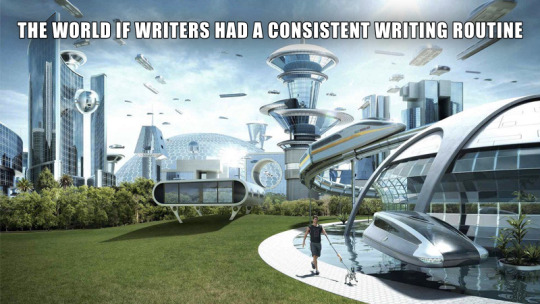
Writing Creating Consistently
Creating consistently is one of the biggest challenges for any creative out there, not just writers. But despite so many people experiencing the same exact problem there is no universal solution. And the reason for that is simple: every person is different and the reason behind their struggles are just as diverse as humanity itself. For some it’s just difficulty keeping a habit alive, for others it’s circumstances of life and for people like me it can even just be their neuro-type.
But it’s not like there’s nothing you can do. So, here are two ideas to try to write more consistently, for both the organised and the chaotic:
Journaling +
This idea works best for those who don’t struggle too much to keep a habit alive or those who already journal or do something similar regularly anyway. Basically all you do is add a daily writing task to your routine. It can be anything like writing a short paragraph, working on character details or even just researching something. What exactly you do doesn’t matter as long as you’re doing something. But the most important thing to keep in mind is to keep the task tiny.
Once we start doing something, more often than not, much more will follow naturally. But if we make the task too big, we risk ending up dreading it. For that reason, your daily task should be something easy that can be done in no more than 5 minutes. That way you’ll get the satisfaction of doing something almost every day and don’t disappoint and demotivate yourself with piled up days of being unable to fullfill your goals.
Tiny Book
This technique works best for the more chaotic (and/or audhd) type and is the one I personally use for both writing and art. The basic idea of this technique is to simply always have something on you to catch your random bursts of inspiration throughout the day. For most people this will probably be their smartphone and maybe one of those cheap mini pens with the rubber stylus at the end. If you don’t like the notes app or just writing stuff down in a text document (or a hundred separate ones) here’s some apps that I use(d in the past):
Obsidian - very similar to a notes app, except you can link documents and build your own little Wikipedia. Including the clickable links within text and all.
Concepts - gives you an infinite canvas to take notes and draw stuff like mind maps. You’ll need a stylus for this one if you don’t want to write with your fingers. There are in app purchases but you really don’t need them and I’m using the free version with no problems too.
Campfire Blaze - (also as website) is specifically built to plan and share your writing projects. It has a lot of pre built functions to plan characters, maps, lore, magic systems etc.
Story Plotter - very similar to campfire except the focus is on structuring your story. A lot of people swear by it but I personally can’t give much more details because it just isn’t my style of program.
If you’re more of the traditional type though, get yourself a small notebook to always (and I mean always) carry around. Preferably a durable one that fits in your pocket and has a loop for a pencil. Also I recommend using a short technical pencil with an eraser at the end to avoid having to carry that and a sharpener around. Remember, we want the most comfortable quick and easy access so it doesn’t become a hassle to always have access to your materials.
On that note,
Why oh why, IKEA, did you stop making those cute but sturdy notebooks? That’s it, we’re breaking up. Søstrene Grene, you’re my new paper supply girlfriend. You may be more dainty and delicate, less sturdy than Ikea, but at least you’re there for me.
Ok but seriously, tip for the artists: søstrene grene has those teeny tiny blank books with really nice paper (easy 100+ pages) that fit into even a women’s front pocket and are perfect for quick thumbnailing. Just make sure to enforce the binging by putting some washi tape ore sum around the edges and glue it down on the backing bc they fall apart easily.
Anyway
Happy writing creating <3
#writers on tumblr#writing#authors of tumblr#tumblr writers#writer on tumblr#writer problems#as always ignore my grammar#english is my 3rd language#and i do not know how punctuation works here#unhinged#writing advice#art#art advice#artists on tumblr#artist on tumblr
45 notes
·
View notes
Note
So, not gonna lie, I’m having trouble understanding this arc and what story the cast is telling, I’m hoping you can help me understand a little bit, are the gods good or bad? Should we be against them? Or is it a thing of “even the gods can make mistakes, their not above criticism and analyzation. And this is humanizing them.” I don’t know, I’m confused.
Hi anon,
If I may, you cannot know the exact story that’s being told by an ongoing improvised show until it completes, and stories for adults often do not have a clear good/bad split but rather encourage you to draw your own conclusions. As a result, I think it is impossible to answer the question that was asked, but I can try to provide some insight.
In Exandria, there are both good and neutral-aligned gods (Prime Deities) and evil-aligned gods (Betrayer Gods), and these gods explicitly oppose each other; they have only rarely come together as when, along with the primordial titans (post-Schism, loosely allied with the Betrayer Gods) they sealed Predathos. The Ruby Vanguard is against all of the gods, whether Prime or Betrayer, and in favor of Predathos. In the past, most heroic characters we’ve seen have been affiliated with either the Prime Deities or with entities who are neither, and most villainous characters we’ve seen in the past that were associated with a god were associated with Betrayer Gods.
During this arc, we’ve seen a lot of people’s opinions on the gods, and we’ve seen the actions of various people, affiliated and unaffiliated, with the gods. But we’ve actually only quite briefly seen the gods themselves, during FCG’s two castings of Commune, and the Dawnfather’s visitation upon Deanna. So, in the interest of guiding people towards developing their own conclusion on the gods: Would you form an opinion based solely on the opinion others have about something? Or would you take into account their biases, their reputations, and the structures of their arguments, and if possible, go straight to the source?
The Ruby Vanguard and Paragon’s Call, as well as people who have found meaning in Ludinus’s speech, have fallen into three broad categories:
Some, like Tuldus or the people of Hearthdell, have suffered at the hands of those who worship the gods. Whether this is the will of the gods or not is unconfirmed.
Some, like Liliana Temult, and possibly Ludinus Da’Leth, have suffered in life in general, and see this as a failure of the gods. This in fact touches on the question of theodicy (“if there is a god, why does evil exist/occur”) which has been a core question of religious philosophy in the real world for at least four millennia. I do not think we are going to be the ones to answer that definitively.
Some, like the various underlings at the Tishtan site, are merely apathetic. The gods don’t mean anything, good or bad, to them, and they are getting paid to help build and protect the key, so who really cares what happens.
The player characters we’ve seen this campaign have, with the occasional exception of Imogen (whose opinions fall weakly towards the middle category), either been in favor of the gods; apathetic but have not been given any incentive towards releasing Predathos; or apathetic/neutral but have suffered at the hands of those who worship Predathos. Indeed, one can argue that everyone except Deanna and FRIDA have suffered in some way at the hands of those who worship Predathos by being teleported at random. Certainly all of Bells Hells has by being attacked and in some cases murdered.
Now: I think that the point of this exercise is to help you make your own decisions, but I’ll reveal my bias. I think the most consistent message of this arc is what Ashton, Orym, and Laudna have been saying the entire time: regardless of whether the gods are good or not, as individual entities or as a greater system of power, people have always had free will. And regardless of whether the gods are good or not, Ludinus, Otohan, and other members of the Ruby Vanguard have slaughtered innocent bystanders without a second thought. I think the most important takeaway is that the primary source of both good and evil in the world of Exandria is, and always has been, mortals. The gods of the story are real within the story, but from the perspective of an outside viewer? This seems almost purely metaphorical to me. If things are less than ideal - if parts of complex systems have at times perpetuated harm, perhaps - should we introduce an unknown force with its own unknown potential to do harm to destroy them? Or should we work to address the issues within the existing system and at the very least gather considerably more information before asking something that might be even worse to rescue us?
69 notes
·
View notes
Note
Re your meta: How has immortality not been a good experience for Darkling? He grew to be quite powerful because of the immortality and time.
I’ve talked about this before in a slightly different context.
He does have power, but that power has been acquired at the expense of all other potentials for happiness.
I would frankly argue that immortality bringing him misery isn’t necessarily a matter of interpretation rather than outright text. The narration often brings attention to his bleakness. He is isolated, feared by even the people closest to him— rightfully so. His most important relationship is with his mother, an equally miserable and bitter woman who he blinds, who eventually commits suicide in a bid to stop him. The sincerity of his desire for some sort of connection with Alina is debatable (I think it is genuine) but it is fact that he basically has no one else.
His life just doesn’t sound particularly fulfilling! And you may attribute that to his actions rather than it being an inherent effect of immortality. But immortality is what has shaped him into the person that he is by the trilogy.
In my opinion, the story doesn’t function if the Darkling is happy. If he were happy, he wouldn’t be so unchangeable in his perspective or *afraid* to be proven wrong. If he were happy, he wouldn’t need Alina to turn out exactly like him and to validate his choices. He is a character that is ruled by sunk cost fallacy.
He is positioned in the narrative as Alina’s foil and the threat of what she could become. The story draws a direct line between power and immortality, and the main theme it is concerned with is the inherent corruptive nature of power. Therefore immortality itself, as a concept, is presented as a corrupting state.
I don’t tend to approach the trilogy and the duology as a single narrative, because I feel they thematically contradict each other and aren’t written with the same ideas in mind. But it’s worth bringing up that the other immortals we see in KoS are uniquely warped, completely othered from humanity, and also distinctly miserable. Even outside of their purgatory, Elizaveta would simply never be happy. Neither would the shambling, shape shifting mass that is Grigori. The series pretty consistently presents immortality as a cruel and wholly transformative fate that, ideally, should be avoided.
That’s why in Demon in the Wood we see the Darkling so young and so vulnerable. He has a capacity for cruelty even then, but it’s explicitly due to the direness of his circumstances. That’s also why the faint nods to his insistence of the Grisha following peasant customs is, imo, really integral. Likewise, his claim to only being motivated by the greater good of his country and Grisha as a whole, is a farce now. But it wasn’t always. To fulfill his role in the narrative, he cannot have always been an unfeeling, selfish mass murderer. It’s his long life that has slowly transformed him into that.
He starts out ambitious, but that ambition has eaten at him from the inside until he’s nothing but a husk. The sheer force of time has slowly worn away at his morals, has made him discover that there isn’t any line he wouldn’t cross if it‘s for a good enough purpose. And over the years, the bar he needs to clear for “good enough” drops lower and lower.
The longer he lives, the lonelier he becomes, the less he sees other people as people, they’ll all die in the blink of an eye anyway. The more he sacrifices for gaining power, the more he becomes convinced that power is the only thing that matters. He cannot even consider any other way to live, because if he did, that means acknowledging that all those centuries of being miserable were for nothing.
I know your question wasn’t a moral one, rather than approaching it from his perspective of happiness. But with such a (formerly) ideals driven character, I think the realization that he’s sitting on centuries’ worth of accumulated corpses for absolutely no pay off or greater purpose is itself a looming source of anguish that he’s trying very, very hard to avoid.
#shadow and bone#grishaverse#king of scars#the darkling#aleksander morozova#all the bendy punctuations#a mysterious stranger has appeared#i ramble sometimes#meta#*writer’s cap*
12 notes
·
View notes
Text
@nightmare-foundation from here
To be completely fair Salem has kinda been harassing, killing, and ruining Oz's lives for millennia 😭 she tortured a 15 year old boy who wants nothing to do with her, and it's directly stated by jinn that Salem manipulated Oz. I love Salem as a character, but as a person she's repulsive. Oz isn't perfect but he's infinitely better than her (no pun intended lol, also not looking for an argument or anything)
not out to pick a fight here, just want to lay out my thoughts:
the question ruby asks is "what is ozpin hiding from us?" and the answer jinn gives her is couched explicitly as a fairytale ("once upon a time, there stood a lonely tower..." and of course the episode itself is named the lost fable). this in a narrative where the veracity of fairytales is consistently questioned and ozpin explicitly leverages fairytale and legend to conceal information and control the narrative.
(see also 'the story of the seasons' and 'the two brothers.')
moreover, in "fairytales of remnant" ozpin's commentaries on 'the infinite man' and 'the girl in the tower' specifically discuss propaganda and the importance of skepticism: "no one who wasn't there could know what really happened. and even then, they would only have a small part of the story." and "one must always be prepared to think about and question everything they read or hear, especially if they are told it is the absolute truth."
likewise, "question everything" is a key theme of V5 and that theme largely centers around ozpin's dishonesty. so this is the narrative context in which TLF occurs: is jinn an objective narrator, or... is she answering exactly the question ruby answered, and telling the story as ozpin remembers it?
i think TLF sits firmly in the "ozpin's side of the story" camp, and i read it with the presupposition that the narrator is unreliable.
so, with that in mind: jinn insinuates that salem lied to ozma ("salem, fearing ozma would reject her, blamed the end of the world on the gods") and draws a rhetorical equivalence between salem's rebellion and what she tells ozma they should do ("the hearts of men are easily swayed.") the implication that salem manipulated him is quite clear.
however: TLF is what ozpin was hiding.
by definition, you cannot hide things you don't know; ergo, none of the information revealed in TLF was unknown to ozma prior to ruby asking jinn this question.
it follows that either salem told him the whole story, including her own part in it, or ozma asked jinn what happened. given ozma's utilitarian usage of the lamp ("where are the other relics? what powers do they possess? how can i destroy salem?") and the effort he devotes to burying the past, i think it is much more likely that he heard it from salem.
further, what salem told ozma according to jinn isn't a lie. in fact, salem blaming the gods for the end of the world corroborates the explanation the god of light gave to ozma ("a... tragedy has befallen your home at the hands of my brother"). yet: "ozma, still unsure of where the truth lay, kept his task and the relics a secret."
salem's account of what happened differed significantly enough from what the god of light told him for ozma to doubt her; where light blamed his brother, salem blamed both gods.
the scenario that i find most likely is that salem initially glossed over the rebellion but told ozma everything else: that she petitioned the brothers to bring him back, that they cursed her, and that they eventually decided this wasn't punishment enough, declared humanity a failed experiment, and wiped everyone out. then, later on, she admitted that she incited rebellion against them and told ozma why she hid that from him at first.
after all, "salem blamed the end of the world on the gods" tells us absolutely nothing about how much detail salem went into. just the conclusion she came to about who was to blame.
meanwhile, we do know exactly what secrets ozma kept from her: he didn't tell her about his task or the relics. this is important, because ozma later voices concern about humanity being "more divided than ever," and salem answers without having the full context.
"we could become the gods of this world. [...] we can mold these lands into whatever we want—what you want!—create the paradise that the old gods could not." <- this is a course of action she suggests in response to ozma bringing up "humanity is divided" as a problem he would like to solve. from salem's perspective, ozma just told her that he has an ambition (uniting the world) that dovetails with her own desire to make a better world without the gods, and she really does believe they can do it!
but what ozma actually wants is to unite the world on behalf of the gods, then summon the brothers back to remnant to judge whether humankind has earned redemption or not. his true goal is the exact opposite of what salem proposed, but he doesn't tell her!
"the hearts of men are easily swayed"—but she did not exactly twist ozma's arm, here. all she does is enthusiastically go "we could fix that!" in answer to ozma fretting about the state of the world, and ozma... doesn't object, at all. her wording makes it abundantly clear that she would never accept the divine mandate, so he... keeps that a secret from her. for years!!
one of them is being manipulative here. it isn't salem.
and—well, look at how she reacts when he finally does object.
"are we sure this is right?" <- he's explicitly asking for her opinion.
"you said we needed to bring humanity together; in order to do that, we need to spread our word, and destroy those who would deny it." this is an indirect answer: whether right or wrong, their actions now are what's necessary to achieve his stated goal. but is it a manipulative answer? does she intend to shut him down?
or is she trying to broaden the discussion? he asks, "is what we're doing right?" and she answers, "well, it follows from our objective. does the end justify the means?"
he says, "this isn't what he asked of me." <- hard objection.
she says, "what did you say?" <- request for clarification.
he tells her everything: "the true reason the god of light had brought him back, the relics that lay scattered around the world, and the day of judgment he had been told to prepare for."
salem—though visibly unhappy—listens calmly, without interruption, until he's finished and turns to her for an answer. and of course her answer is to reject the mandate altogether ("don't you see? none of that matters anymore!") because in her view the brothers are tyrannical monsters and the world is better off without them, as she made crystal clear from the very beginning.
but she doesn't reject ozma; she holds out her hand and asks him to forsake his task and try things her way.
and what stands out the most to me about this whole scene is that at no point does salem appear to be unwilling to have the discussion. she answers his first question in a very open-ended way, asks him a question when he says something she doesn't understand, sets her own feelings aside to hear him out, and then couches her rejection as a question—why does it matter what the gods told you, why should we try to "redeem" these humans?—whilst making a gesture that very explicitly invites ozma to engage with what she's saying.
but like, at no point in either scene does ozma reciprocate that; he doesn't push back at the start, and when he doesn't like the answer she gives him he appeals to divine authority rather than engage with what she actually said, and when she questions the mandate he straight up just walks out. is that salem's fault? does it make sense to read this as learned behavior caused by salem's treatment of him when he acts the exact same way from the start?
in the real world we call this missionary dating.
just as ozma isn't to blame for salem attacking him, salem isn't to blame for ozma doing this to her.
anyway, as for the idea that salem has been hunting him and tormenting him ever since:
jinn says, "no matter where or how he lived, her presence was always felt"—and what we see is two beowolves attacking the town.
but:
salem does not control every grimm in the world, and there are many, many examples throughout the story of grimm attacks happening without her knowledge or control. most notably, grimm attack the argus express, with oscar on it, at a point in time where salem doesn't even know ozpin is back yet.
as per 9.10, twelve years ago, ozpin's last-minute secret urgent missions so regularly turned out to be false alarms that he had a catchphrase about it. his own inner circle told inside jokes about his paranoia! and the sheer level of destruction salem has achieved in just two years calls into question the assumption that this is a normal state of affairs.
over the course of the show, we've seen ozpin make several grievous miscalculations based on the assumption that salem will prefer to remain in the shadows. her first move involves orchestrating a massive terrorist attack on an internationally-televised sporting event. she openly lays siege to atlas and smiles while she watches ruby reveal her existence to the world.
ozma sees salem's hand in every grimm attack and every crisis he's weathered throughout the years. he also very badly misjudges her strategy and tactics when she actually goes to war.
do we trust his perception that salem is the mastermind behind everything bad that has ever happened in his vicinity?
on the other hand, ozma explicitly believes that "if humanity were ever to stand a chance of being united," salem has to be destroyed. he explicitly decided to search for the relics in order to "rid the world of her." and after asking where to find those relics and what they could do, the third question he asks jinn upon finding her is "how can i destroy salem?"
there is zero ambiguity about this. for thousands of years, his main goal has been to get rid of her. and... considering that she was legendary when ozma first returned ("during his years of travel, he heard the same frightened whispers that spoke of a terrifying sorceress who commanded dark powers in the wilds among the beasts and monsters..."), he's been quite phenomenally successful in eradicating her influence and presence even though he cannot, of course, actually get rid of her.
the point of this is not to justify any of the things salem has actually done—ozma is no more responsible for her actions than she is for his—but to argue that she is justifiably angry at him.
i think the text makes it quite clear that salem was profoundly traumatized by the way he treated her, because he took advantage of her trust to lie and manipulate her into serving gods she vocally rejected and then spent thousands of years crusading to get rid of her. i think the common fanon—that salem is a spoiled brat who abused ozma while they were married, "ruined her own happy ending," and now unfairly blames him and wants to destroy the world to spite him or punish him for "leaving" her—is flatly countertextual.
41 notes
·
View notes
Note
Hello, sorry if this is random but I was wondering if you could give some advice for writing fanfics? I’m pretty new to writing them, and feel very unconfident about my writing skills.
oh gosh, im flattered you think im a good person to go to for advice with this. I'll do my best to say something helpful.
General writing tips:
Read! and not just fanfics. it's the second best way to improve your craft overall.
Write! this is the number one best way to improve your writing. practice practice practice, even if you're not going to upload it anywhere. even just sitting down to write a few paragraphs of whatever comes to mind is good practice.
Be intentional in your writing. Why did you have that character say that? why did you use that adjective as opposed to another? why did you structure that sentence in that manner? what are you trying to get across to your reader with your choices? Think of yourself as controlling a spotlight for a play that the reader's eyes and thoughts have to follow along with.
use a mix of simple, compound, and complex sentences. too many simple sentences makes your prose choppy, but too many compound and complex sentences makes it hard to keep track of what's going on. think of simple sentences as giving the reader's brain a break. simple sentences can also be used for dramatic impact or to draw attention to something important, especially if you put it in the middle of or right after a long winded sentence or group of sentences.
Show AND tell, and be intentional about why you're doing one over the other for a particular scene. Showing is better for imagery and making a scene vivid or dramatic, telling helps you tighten up the pace of a story. it's not too dissimilar from why you should use a mix of simple, compound, and complex sentences.
motivation motivation motivation. What motivates your characters? why are they saying what they're saying and doing what they're doing? Keep those motivations consistent, and their methods of obtaining what they want consistent, or at the very least changing in a way that makes sense for their character growth.
Read it out loud. Reading what you write out loud to yourself is a great way to notice not just spelling and grammatical errors, but where your writing flows well and where it doesn't.
Fanfic tips:
Stay familiar with the source material. rewatch, reread, replay. pay close attention to how everyone's characterized, and refer back to those canon characterizations in your writing. If your characters are in an AU or aged up or down, make sure their characterization still makes sense when you take the source material into consideration.
that being said, don't be afraid to take some artistic license! fanfics exist to give fans something other than the source material to chew on. showing how their characterization would change in different circumstances and settings is part of the fun.
practice mindfulness and self affirmations, i am dead serious. putting something you crafted out into the world is so super vulnerable. be aware of any feelings this brings up, don't judge yourself for having those feelings, and then practice letting those feelings go. remind yourself that no matter what your skill level, every single time you write something, you are still practicing and learning new things. this is true of every writer ever. also i supes promise that if you post something no one ends up engaging with, you will still live to write another day. remember, a human being can survive anything short of being flattened by a steam roller.
that's all i got! would appreciate people adding onto this as sometimes i am but a potato smacking itself against a keyboard. again im super flattered you'd come to me for advice, ty for your interest in my writing <3
7 notes
·
View notes
Text
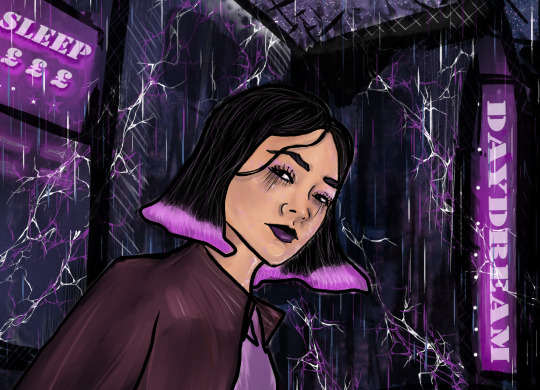
“I don’t want your copy ‘n paste endearments.” - Ayumi, The Dream and the Weaver
This May, The Dread Machine released their second anthology Darkness Blooms. I was one of the lucky authors to have their story featured and, as imagery was a key theme for me, I wanted to do a mini-blog series about what inspired me alongside drawings of the characters and machines 😊
The Dread Machine’s call was for dark sci-fi stories with themes about identity, community and security.
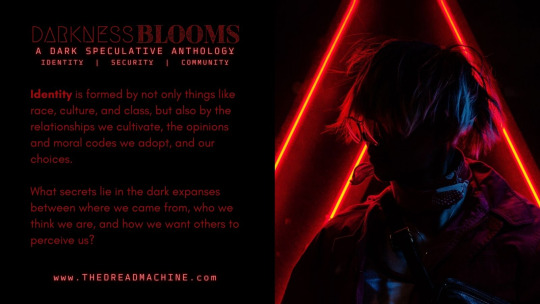
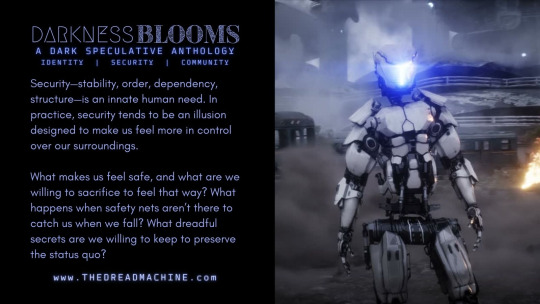
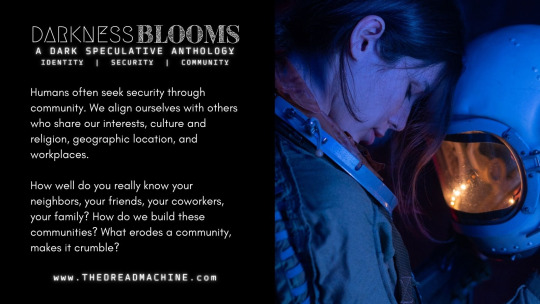
The Dream and the Weaver follows multiple characters in a future where productivity is lauded and sleep is no longer seen as a basic right. Workers have installed in their brain a ‘Cricket’, which sits next to the amygdala. This nub processes our emotions and is connected to how we retain memories, learn new things and experience sensations.
Should someone start to fall asleep, the cricket shocks the user to induce a heightened state of anxiety and keep them awake. The humans in The Dream and the Weaver have had to adapt, but, just as the Weaver Mashoka warns:
Drain a battery too much and glitches occur.
Messages ping that do not really exist. A logical outcome is not arrived at. A stutter. A freeze. The rule to protect human life cannot be properly or consistently followed if systems have slowed down.
Because of this. People have forgotten how to dream their own dreams.
Sleep is sold back to consumers. Dreams and nightmares are treated like any other form of media entertainment.
Dream sharing is managed by two machines: the Dreamer and the Weaver. The Dreamer links up to a database of pre-designed dreams. The Weaver acts as a firewall. They stop dreams from becoming nightmares and help users ease into sleep, as most no longer know how to access it naturally.
Alongside this is the Web.
Society’s tattered webs drape moonscrapers, dulling stars into embers. Thoughts and store discounts travel through membrane-clotted wires.
When a child is born, they are held aloft on the roofs. A strand reaches out, tucks itself in an ear and forms a shawl, just as muslin was thrown over cradles to keep away the scary things beyond.
Now the Dreamer holds us all, only masking what screeches past the city’s defenses. Nanites squirm in the folds.
Society is connected via the Web, a satellite system linking everyone’s Crickets. Advertisements are blasted into our minds. Politicians pretend they’ve been hacked when a stray, unpleasant thought is picked up by the public.
While what awaits beyond this cloak doesn’t get a mention in the story, it does appear in a future tale that will hopefully see the light of day - Gulls Are Her Crown - once it escapes my work in progress drawer.
Even though the Web links everyone in the city, isolation and loneliness is at its highest. Why waste precious time interacting with others when the good and ugly thoughts of the mass thrum under the skull?
For someone in mourning, with the roar of the mass making it even starker that one dear voice is lost, it must be maddening to live in such a society.
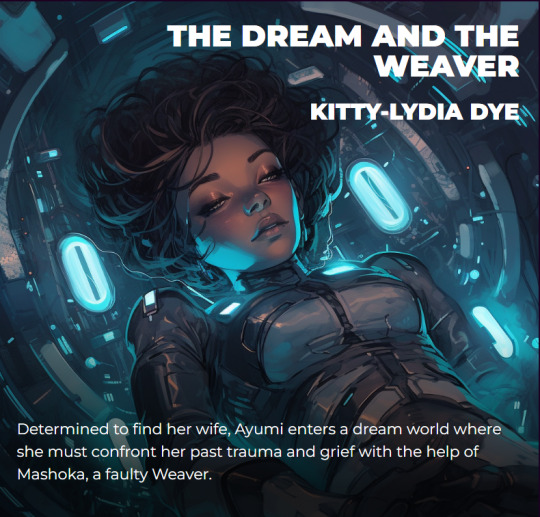
Ayumi, titled the Widow in this story, has found another use for the Dreamer. After the loss of her wife, she travels through the dreamscape searching for her wife's final moments with the help of a malfunctioning Weaver.
Those grieving are barred from accessing sleep in a misguided belief focusing on the waking world, the living, will heal them. Ayumi has to access sleep illegally.
Ayumi wasn’t the first character I created for this story. She was actually the third after the nameless itinerant worker in the Nightmare section and Mashoka. The Dream and the Weaver was inspired by two old drafts that were collecting dust on one of my flash drives.
The first draft, Dream at A Price, was a much darker story without the hopeful ending of The Dream and Weaver, and focused on the entertainment section. Fight clubs where users plugged into Dreamers, which were then called Dream Sharers, so injuries wouldn’t show on the body. The most extreme of battles could take place, while what the mind went through was left to fester.
The main character was the spirit of the Dream Sharer’s creator. She burrowed into the minds of those accessing the devices, setting out to destroy a machine that had originally been created to cure traumatic memories and had instead been cruelly distorted.
In The Dream and the Weaver, the living reaches out for the ghost.
Dreams were imaginations with the collar snapped off or corrupted memories turned strange and cruel by fear. The machine grasped them in its claw, tore a seam open and invited people to peer inside.
All at affordable subscriptions, of course.
- Old, scrapped scene from Dream at A Price
The other draft was called Dreamweaver. Humans were put under an eternal lockdown, so machines could protect and nurture the flowers A.I. had deemed superior to flesh.
Characters used Dreamweavers to hack into the machines, travelling the dreamscape to reason with the evolved A.I. in the hopes of freeing humanity. This plotline will hopefully be revived in Gulls Are Her Crown.
“They needed a new flavour dream to keep you here. That is why they installed me. I went to the place they dare not let humanity near. To the great oak tree. You saw it within me. You searched and hungered and kept calling, no matter how many times the Observers separated us.”
“Trees no longer exist.” There are bone shards in my throat. The more I swallow the harder they pierce me. “We're still waiting for the miracle.” For the land to forgive us.
- Old, not so scrapped scene from Dreamweaver
In The Dream and the Weaver, I wanted to focus more on the breakdown of humans/sleep as well as weaving in an emotional connection. This led to the creation of Ayumi.
For this character, Darkness Blooms' themes are shown through the loss of security and community. Her grief has caused her to break her Cricket. Ayumi begins to lose herself in the identities of the Dreamer's past users. The further she dives, the greater the risk her mind will be overwritten by second hand memories. All so she can see her wife one final time.
Throughout Ayumi’s sections, the symbolism used for her are things – machines, advertisement jingles that are near forgotten – which are dying but still have one final spark, and if that spark was nurtured it would blaze into life again.
The Dread Machine have also put up a reading playlist on Spotify. I think, out of the songs, Ayumi most relates to Homecoming – Makeup & Vanity Set and Six Feet Under – Billie Eilish.
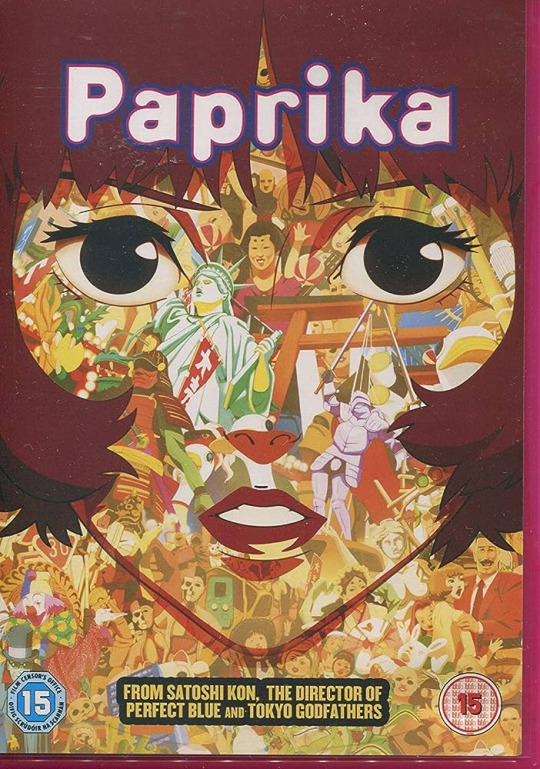
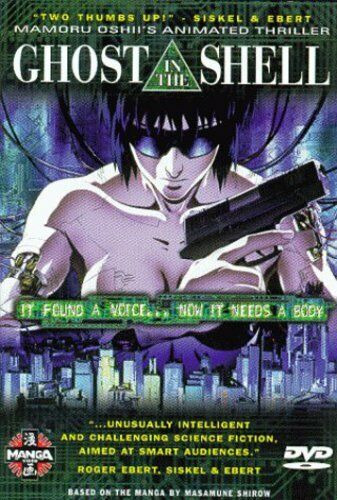
I think it’s probably obvious what anime movie inspired me. I watched Paprika when I was around 13, which is a long, long time ago now!
Did I have any idea what was happening? No, but I loved how vibrant the film was alongside the beautiful imagery and suddenness of the ordinary being transformed by surreal imagination. I wanted to see if it was possible to get the wilderness of dreams across in the written word.
Ghost in the Shell’s aesthetic was another influence, particularly the download/upload of the ghosts (although all I’ve currently seen is the first movie and a few episodes of S.A.C. A Modest Rebellion – Android and I is my favourite one so far).
As I wanted to focus on the dream/fantasy elements of my story, I decided to research myths and tools related to sleep throughout the ages, particularly dream catchers. Also, because I am absolutely terrified of spiders, but slowly trying to get used to them by writing about them, spider imagery is common throughout my stories.
Considering spider webs are believed to be able to protect against evil forces, I thought it a good pairing: the sinister effect of a creeping spider along with dreamcatchers that are meant to soothe and protect.
Pixels flutter. Silk cocoons crack, budding with moths. The
spider twitches and leaps to the window, packing webbing into its
abdomen, until it squats alone in the corner.
It drops, legs tickling one another as sticky string spills out. The
trap is strummed, luring the moths back. They’ll never escape.
I tear the web, wisps hanging from my nails, but it’s no use.
The web glitches to the beginning and the spider weaves anew.
The Weaver knows what to do. It curls its remaining fingers around its face.
A soft twangy noise, stilted at first, forms a basic tune. The Weaver plays itself like an instrument.
Do flies hear such a song, when they come too near the web?
My next post will feature sketches of several Dreamer and Weaver models. After that, I’ll write about the second voice in this story: Seb, the magpie. His section deals with the cost of sacrificing your identity in exchange for community and security.
The Dream and the Weaver, alongside sixteen other great stories, can be read in Darkness Blooms. It is available direct via The Dread Machine’s website – ebook, print or hardcover – and I have to say the hardcover version I received as an author copy is gorgeous.
The Dread Machine | Where nightmares are manufactured.
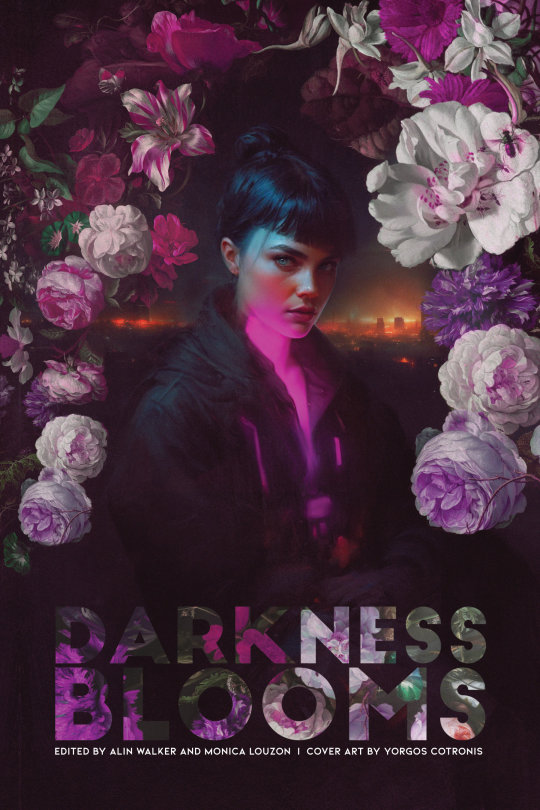
#darkness blooms#the dread machine#kitty-lydia dye#the dream and the weaver#science fiction#fantasy#horror#dark science fiction#mecha#art#writer on tumblr#anime#spiders#dreamcatcher#writing#haha I've written loads and probably no-one's going to notice#but it's certainly helping with plotting out Gulls#did I write a glossary for the world I built? no And now I'm scrambling to remember everything#books#literature#fiction#scifi#scifi art#scifi writing#cyberpunk#cybernetics
7 notes
·
View notes
Note
🔥Poppy Playtime
Ehhhhhh….
It doesn’t draw my personal ire like Bendy because unlike Bendy it doesn’t lie about what it is, but like, it’s so obviously courting a kid audience despite how bloody and grotesque it can be which makes me pretty uncomfortable. Other games like it don’t do this. Five Nights at Freddy’s has jumpscare and scary monsters but it’s at least bloodless and the actual violence is relegated to 8-bit graphics and side merch like books which are just goosebumps with a consistent theme. Bendy has all of its violence sanctioned because it pulls a samurai Jack and makes all the characters non humans so they just turn into black ink when killed. But I’ve seen Poppy gameplay before there’s some fucked up imagery in those games.
I don’t know I hate to be a boomer about this but like, maybe we should be concerned that a property that’s really comfortable with being violent in a way most PG-13 horror is is being marketed so heavily to 6-9 year olds in an unregulated space without supervision. Feel like that’s probably not good for their brains in the long term.
Also they made NFTs why are we still giving them attention?
11 notes
·
View notes
Text
RUIN Thoughts!
Under the cut for your convenience to avoid spoilers!
I have seen pretty much everything that is out/widely known about as of day one so I'm just gonna ramble about everything. Starting with positives and then getting into the things I didn't like towards the end. Cause hoo boy are my feeling very mixed about this whole thing let me tell you.
I like Cassie! We have proper context and motivation for her right off the bat. Immediate story improvements there!
The gameplay of the whole DLC looks way better. Personally I've never liked games that box you in to one path too much in a way it's too obvious, but the DLC makes it realistic and gives paths that loop back around to places you've been. The map still doesn't make sense but that's just the SB experience at this point I guess.
Eclipse. ECLIPSE. ECLIPSE CANON OH MY GOD. He's sweet and gentle and acts just like how a caretaker should! Sun pleading for help and Moon expressing their pain being forced to work as entirely separate programs, both of them fighting each other's triggers.... Aauughhhh I love them. The fact that all they needed for so long was a simple reboot and there were just no human workers around to do it.... 😭
AND ROXANNE. Seeing the side of the characters actually being child entertainers is so nice! Even if it was done just to make the moment bittersweet. "Do you still like carrot cake? I like carrot cake." They're all supposed to be kind. They're supposed to be good and wholesome and they've all been twisted into monsters that aren't their true selves.
High tech AR Vanny mask.... but no Vanny... 🤔 sure game, whatever you say
On the other hand, no map bot, but mask bot? Clever sleight of hand Steel Wool, I see you
Bonnie design reveal!!!! Further implications that Monty murdered him!!! I...! I'm not sure I like it. It's difficult because he has no consistency in his appearance. The Bonnie Bowl mascot is purple like OG Bon but the design we see in the gator ride telling Monty's backstory is blue. What are those shoulder pads and how would that work on an animatronic, like at all?? He has no room to move his head! Don't get me started on the inconsistent coloring between his gloves and his outfit. Idc if I sound pretentious for this, the clothing choices hurt me as an artist tbh. If you're gonna make him blue let him wear hot pink or or even yellow. Idk idk it just didn't mesh to me. Oh and his neon sign had the star glasses but his cut outs didn't. Inconsistency is Steel Wool's middle name.
What is with the glitchy shadow rabbit? Why is it shaped like a map marker? Is that supposed to be Glitchtrap? A security system...? I don't understand the point of this storywise at all but sure gameplay go brrr I guess
What the fuck is the Mimic. No seriously. I don't know what it is. Why is it here. What is happening. I am well versed in the canon of these games what is- .......... So it's another Book Thing. Haha. No. Bad. Stop that. Whoever signed off on the "let's add book lore to the games with no explanation or fathomable reason" decision, I am spraying you with a water bottle. Stop alienating those of us who don't have the time/money/desire to buy and read the books. I hate the books personally and have been actively ignoring them since the Plushtrap Chaser one. They are meant to be fun side stories for people who want that, not main game canon!!! Stop it!! I am actually begging you!!
TL;DR I like the characterization given to everyone this time around, it felt right for them. Bonnie's design is inconsistent and kinda mid. And trying to force in booklore most people won't know about is just stupid and I'm mad about it. That's about it.
I definitely wanna draw Cassie with Roxy post game- because I do believe she survived that elevator crash- and maybe make a Bonnie design I'll like better. And I definitely wanna see other people's art. That'll be the best part of all of this.
#ames rambles#fnaf security breach#fnaf ruin#ruin spoilers#security breach ruin#five nights at freddy's
9 notes
·
View notes
Note
curious about your doto thoughts. i only played it once and reasonably enjoyed it (if anything, i had more issues w dh2) so im interested to read about your experience
sure thing!
first off i want to be absolutely clear that this rant is 100% petty. doto didn't, like, burn down my crops or (to my knowledge) influence any kind of shitty trend or real world harm. i don't have issues with gameplay, art etc which are ultimately bigger draws in the series. and the story was straightforward and mostly internally consistent, so ignoring the prior games, even that could be worse. but despite arkane claiming it worked as a standalone, much of the narrative's weight DOES rely on previous games. so i think it is fair to measure it up against previously established aspects of the series, and find it wanting.
when i saw promo material i thought the concept was... flawed. to be exact, i mean the idea of a) daud and billie going to b) kill the outsider because c) he's responsible for the awful shit in the world. any one or two of those points wouldn't have given me pause, but all three together seemed pretty contradictory to what we knew about the setting and the characters.
the outsider isn't responsible for the awful shit in the world. he just isn't. i do not think the previous games could possibly have emphasised this more. his direct actions are giving a handful of people magic powers and some hints, but what those are and how they are used (IF they are used) are shown to be completely reflective of the individuals both in story and gameplay. the average person in the empire is not affected by the existence of the marked at all. there is no evil magocracy. the closest thing, delilah's reign, is a takeover of the entrenched power structure and it can be defeated with the protagonist's own outsider-given abilities.
gangs, corruption, police states, religious control, wealth inequality, spreading of disease - these are the real issues that the citizens of dunwall and karnaca face daily, and they are completely independent of the outsider. time and time again we see that casting him as the source of society's ills is a hollow excuse for the perpetrators; it's exactly what the abbey does as it kidnaps children and murders "heretics". as a player, why would i think about killing the outsider when there are so many rotten institutions right there? it's even worse when dh2 portrays him as a historical murder victim himself, who seems to prefer it when people don't abuse their powers, even if he cynically expects they will.
and no one should know more about human choice than daud, post his dlcs. like, his entire character arc was realising that whatever the outsider gave him, he alone was responsible for his actions, so he must bear the consequences. it all comes down to his canonical low-chaos speech in dh1, after seeing corvo deliberately NOT slaughter his way through life: "you took a path i could have followed, but did not... you choose mercy. extraordinary." we are given every reason to believe his desire to retire peacefully is earnest and something he follows through on. the story's premise would be cheapened if he didn't.
as i see it, the key theme of dh1, its dlcs and dh2 is that, while privilege may blind and power may corrupt, there is always the choice to do better, and it is often the harder choice. and look, i think the doto writers may have been trying to expand on that. what about the root causes of privilege and power? who draws the lines? who can best try to take the system down, and what happens when they do? fair questions! but doto looks for the answers in all the wrong places, and so is at odds with the other games instead of in conversation with them.
it's kind of perfect that doto is so resolute in downplaying agency, really. if you're going to ignore the details of the stories you're building on, why not go the whole hog and make your message completely antithetical to theirs.
billie is the player character, but she is not in charge. she pretty much just goes along with whatever daud says, though she's not his young protegee anymore, and she had plenty of autonomy back when she was. there's so much focus on what daud's done and his mission and his angst about how he turned her into a killer and she's the one who has to carry out this job because he's dying etc. when they first reunite he asserts that he knew she'd come find him. because her life is supposed to revolve around him, i guess? ugh. a sprinkle of sentimentality is fine and even heartwarming, like the writers intended it to be, but to have it as The Story in this way just gives the impression that she's little more than an extension of him.
sure, you CAN technically question daud's idea of the outsider's culpability at the end, but 1) daud's dead and 2) the conversation goes straight back to whether the outsider should die for what it's asserted he's done. anyway, one argument in favour of saving him is "this wasn't his choice, he never asked for this power" lmao. it's just like how billie's void powers are forced on her (in an awfully uncharacteristic fashion by the outsider, i might add) and we're not supposed to worry too much about any carnage she causes with them.
the chaos system was one of the most interesting ways to deal with the violence = bad problem in violent video games. in doing away with it, doto pays lip service to the idea by having daud and billie wallow in guilt about their pasts, but there are no external consequences that might prompt actual introspection and a change in behaviour for them and the player. this means if you slaughter entire buildings of people, it's no biggie, nothing changes, never mind the fact that the story is trying to pose some ethical questions about murder. it also means daud is extremely annoying the whole way through. but hey - it's totally compatible with the theme that choices don't matter that much.
yet for something that's trying to be so different from its predecessors, i do think that doto relies a little heavily on nostalgia. if you aren't attached to the characters at the start, i doubt the game comes close to the emotional peaks it does otherwise. the narrated splashes aren't gonna do it alone - imagine if dh1's prologue didn't let you play with emily and simply told us that corvo looked after the empress' daughter - and there's not much character development throughout. i was definitely moved at times, i'm not going to pretend i wasn't! but often i felt it was despite the execution, not because of it.
also, "black-eyed bastard" was said way too much.
another issue was that i felt a lot of the script was written and delivered in a manner that wants to make you go "hmm, how thought-provoking", but the questions raised are never explored or answered meaningfully. even the ending is a stubbornly vague "i don't know..."
i got a little sad when i noticed just how often potentially meaty bits of dialogue were redirected. it made those moments come across as insincere and non-committal even if they sounded good on their own. as an example, mid-game billie asks "is the outsider to blame for what we did? does corruption come from the void or from our own hearts?" then keeps talking about her plans to kill him. if she'd instead reflected on who was responsible for her current actions, even if there was no firm conclusion, i could believe that the story was trying to have a genuine discussion about the blame game that we could learn something from. but it's not that deep :(
overall i just feel like doto tried to take Cool parts of dishonored without always considering all the details that made them Good.
a gruff assassin who has beef with god is a cool character, but he's a good character because of the specific arc he went through, and the version that shows up in doto is even less self aware than the one at the start of dh1; billie is cool because of her badass checkered past, but she is complex because her desire to be part of something bigger often conflicts with her independence and businesslike practicality, characteristics that doto doesn't really touch on; the outsider is cool as the powerful inhabitant of a supernatural dimension, but it's the distance from his devilish portrayal in the empire that makes him unique and interesting.
on a meta level, i've never seen anyone indicate a dislike of the outsider as a character, and to me the implications of his existence in the void is the most iconic part of the worldbuilding. killing OR removing him means arkane gives up the easiest, most sensible way to make a future dh game feel like Dishonored. it might never happen, but why close that particular door?* there was lots of speculation that the game was tying up the series for the forseeable future, which was probably true, but simply closing off the kaldwin era would have been enough for that. plus a smaller scope would also have been better for a small game. cosmic upheaval really deserves more gravity than doto was able to give.
what alternatives do i think might have worked? well, going back to the three points i mentioned earlier:
not centred on daud and billie, aim is still to kill the outsider who is believed to be responsible for everything - maybe a particularly zealous young overseer tries to actually do something about the outsider
centred on daud and billie, aim is not to kill the outsider, who is believed to be responsible for everything - maybe they can bring about the downfall of the abbey for good
centred on daud and billie, aim is to kill the outsider, who is not believed to be responsible for everything - maybe they have to reluctantly mercy kill the outsider for some void-related reason, or save him from someone else trying to assassinate him.
could work with any concept (i.e. i totally thought this would happen) - either billie or daud replaces the outsider in the void.
i did have issues with dh2 as well, and honestly they laid the groundwork for much of what i didn't like about doto. while i think the series always has fantastic incidental writing (whatever the collective word is for audiographs, journals etc.) the main stories have never been masterpieces, and dh2's attempt to lean more into character study wasn't super successful imo. to make some characters more sympathetic they sanded off some awesome unpleasant edges - why sokolov of all people got sad-dadified i'm still puzzled by. there's a lot more exposition. i preferred the more detached outsider from dh1. some references to dh1 and the dlcs were too fanservicey for my taste. but i think the biggest hint of things to come was the time travel mechanic - the focus was clearly "this will be really cool to play" and not "this is going to open a huge can of worms on the narrative level which we should try to address thoughtfully", the same way priorities probably were when it came to doto's "kill a god" setup. i get it, they're video games, not books. but this is how you get the insanity that IS the dishonored books. lol.
* i'm not counting deathloop as a dh game, and i haven't played it, but i read that the connections to the dh universe are more than just a couple of easter eggs. imo that does neither any favours - the dh timeline gets boxed in, and it makes deathloop look like its developers don't have faith in it as a standalone ip.
2 notes
·
View notes
Note
Hi! Do you know any good media/writing sources with androids/robots or any writing advixe about it? I’m planning on writing an original fiction story that has two of the major characters as robot/androids, with one being a POV character, and I was wondering if I could see examples of how other people have done it.
…Actually, on that note, do you have any advice on how to write aliens? This is a really weird book.
I love your and Vinelle’s works - they’re really good and every time I think about How I Learned To Stop Worrying And Love the Bacchanals I just sigh in awe of how awesome it is! Have a great day!
Ooh, look @therealvinelle, praise!
Writing Advice in General
The thing about writing is it isn't like art.
There are no guides on how to write specific characters the way there's guides on how to draw certain animals, people, objects, etc. If there were, I wouldn't trust them, as they wouldn't be written by anyone who has any idea what they're doing.
Writing advice kind of starts and stops with classic prompts, breaking down stories into the traditional structures (hero's journey, three-act tragedy, five-act tragedy) and noting well-known writing techniques.
And this is because what you're asking is what I'd call... advanced.
You're at the point of creating your characters to tell a story and want very specific things. You have to come up with what that is and why that works, people can't do it for you.
My Two Cents: It Might Not Matter
The thing about both robots and aliens is they're all over the place in terms of characterization. What you do and how you do it is dependent on what story you want to tell.
There's works where robots are very benign and essentially human, works where robots are not benign but essentially human, where robots are benign but not human, and where they're malicious evil.
Similar with aliens, some works have incredibly human aliens (in both appearance and behavior) some have wildly different aliens.
My point is that you can get away with almost whatever characterization you want, so long as you're consistent and it aids your story your readers will not care.
Whenever I do it, personally, I think of characters being informed by their society as well as... we'll call it biological imperitive. Machines are created to serve a person (one that may not align with human values/traditional human desires), aliens will have their own psychology that will greatly inform who they are and what actions they take.
Think at a base level what the characters want and value and that will inform both what they do and how they communicate.
Things with Aliens and Robots
If you're looking for examples though I suppose I can list out a few.
Alien (great inhuman/malicious aliens as well as androids, highly recommend)
Prometheus (the film by Ridley Scott) (great human/malicious android, less aliens)
I, Robot (the book) (not the best writing or the most interesting but Asimov laid the groundwork for thinking about robotics in science fiction, everyone has some nod towards Asimov and it's good to at least know of)
Blade Runner (great very human robots who aren't quite up to snuff)
Do Androids Dream of Electric Sheep? (not as much focus on the robots but one should always read PKD)
Ex Machina (the android and what they know is the focal point of the movie)
Casshern Sins (the entire cast is androids)
Pretty much anything by Philip K. Dick (not all his stuff is about aliens and androids but... it comes up a lot and it's very good)
The Left Hand of Darkness (the aliens are very human in this one but it shows a lot of nuance of a very different society and what that would mean for the aliens)
The Host by Stephanie Meyer (yes, bear with me, Wanda's very human but the aliens are very well thought out and make a lot of sense)
Dune and Dune Messiah by Frank Herbert (not on aliens, really, but Paul gets very out there in terms of his visions and it's very good at looking at why cultures develop certain ways due to environment and terrain)
And I suppose I'd be remiss/a coward not to note that I've written several fics that star inhuman/alien/robotic characters so you can see at least how I've done it.
The Seventh Seal (starring essentially an alien/android)
Of Shepherds and Kings (starring the personification of a nation)
Morilden (starring essentially an alien)
October (starring essentially an alien)
Finishing the Hat (starring an alien god)
The Wasteland (starring essentially an android)
Light and Shadow of the Distant Sun (starring an alien)
Most things I write have aliens or androids, actually.
17 notes
·
View notes